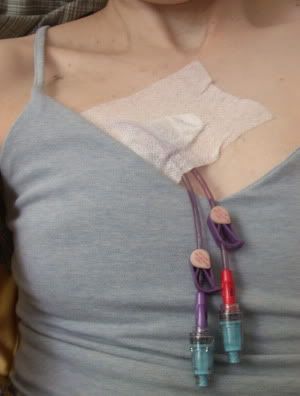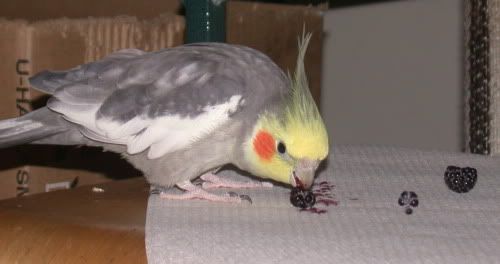My Bible study group recently went through the plague story in Exodus. One theme that kept surfacing was that of attitude toward miracles: the miracles of the plagues are presented as dramatic evidence of God's will. And yet in modern Judaism, as explained by the midrash The Snake Oven, miracles are rejected as evidence of God's will.
In Deuteronomy 30, where Moses is explaining the importance of following God's laws, verse 12 states that a record of these laws "is not found in heaven." The Jewish understanding is that God gave Torah on Mount Sinai, and the post-Sinai interpretation has been entrusted to Jewish scholars: God has agreed to stay out of it.
The Exodus story is so important in Judaism that it has a major holiday devoted to it: Passover. Our study group found the prominence of the plagues in this story to be a stark contrast to the religion's current anti-miracle stance.
The first time this question came up, our rabbi pointed out that the Passover holiday emphasizes the "journey to freedom" aspect of the story, and the plagues get only a minor mention. This consideration lessens the seeming contradiction, but doesn't eliminate it entirely.
Later, we discussed a more interesting possible explanation: in Exodus 10:2, God explains that he causes the plagues so that (as translated by the Jewish Publication Society) the Jewish people will recount the story "in the hearing of your sons and of your sons' sons... in order that you may know that I am the Lord."
At Passover, the Exodus story is recounted in the presence of children. This practice is widespread even among otherwise non-observant Jews: Passover is the most widely celebrated Jewish holiday. The dramatic story of the plagues has motivated generation after generation of parents to tell their children about God's power. If that was their purpose, then the plagues have been wildly successful.
Thursday, July 30, 2009
Why the plagues?
Tuesday, July 28, 2009
Hickman out!
 At the beginning of January, I had a Hickman line installed. I wrote some about it here. The line exited my skin in the mid-right area of my chest; it ran under my skin up to my collarbone; at my collarbone, it entered my subclavical vein. In the photo at right, the scar where it was pushed into my vein is visible near the strap of my tank top.
At the beginning of January, I had a Hickman line installed. I wrote some about it here. The line exited my skin in the mid-right area of my chest; it ran under my skin up to my collarbone; at my collarbone, it entered my subclavical vein. In the photo at right, the scar where it was pushed into my vein is visible near the strap of my tank top.
This line made my chemotherapy treatment safer and saved me from countless needle sticks. I had it for five and a half months. Today, I had it taken out.
While the line placement was done in a hospital operating room with sedation, the removal was done quickly in the surgeon's office. The procedure started with the surgeon injecting the area with lidocaine. There was a cotton sleeve around the line near where it exited my skin; the surgeon opened up the exit point a little so he could see the sleeve. The cotton caused my body to form scar tissue, which is what has held the line in. (The surgeon said they used to hold these lines in with stitches, but have found the cotton-scar tissue method is much more reliable.) He cut the scar tissue away from the line, and then it just pulled right out.
The surgeon put a couple of loose stitches at the exit point. He said he did not stitch it up nicely because the wound was potentially dirty, not something he wanted to seal up. So I'll have a scar there, much like the scar near my collarbone.
When I had the line placed, I lost a lot of movement in my right arm: it was a month before I regained my full range of motion. The surgeon said I would be sore tomorrow when the lidocaine wore off, but that it would be minor and only last for a few days.
Hickman lines are somewhat uncommon; port-a-caths are the most common type of central access line for cancer patients. When people have their ports removed, they often say they got deported. Unfortunately, there are no such cute sayings regarding Hickman lines. Not to dwell on that, though: I'm so happy to not feel like a cyborg anymore!
Discovering light
About a year ago, the light in one of our house's closets stopped working. There seemed to be a problem with the socket. We never got around to fixing it, seemingly content with fumbling around in the dark when we needed something out of it.
At the end of last week, electricians came to our house to activate the wiring in our new living room. In what seems unlikely to be coincidence, this closet light now works again.
Upon discovering this, my partner and I gazed into the lit closet. "Hey, we have an iron!" I said. He says, "Are those my tennis shoes? I didn't know I had tennis shoes!"
It's like Christmas in July.
Wednesday, July 22, 2009
My cancer story
I was diagnosed with primary mediastinal diffuse large B-cell lymphoma in December 2008. After months of vague symptoms, I developed a horrible dry cough. As part of investigating my cough, my doctor ordered a chest CT scan. The images showed a tumor under my breastbone that was over five inches wide.
After six months of chemotherapy, the last part of my cancer treatment was a decision to add radiation to my treatment plan. I wrote two posts about my radiation experience, one during treatment, and one after I was finished.
I hope my story is helpful to others. If you have any comments or questions, feel free to email me; my address is 
Throughout my battle with cancer, I have found a lot of support on the message board community at http://forums.lymphoma.com/. They have a "share your story" thread where I have posted a much more detailed description of my initial symptoms and how I was diagnosed.
Before I knew I had cancer, I wrote several posts where I talked about being tired all the time:
- Feeling better
- A mean sick
- Procrastinating past first frost
- A long fall
- Wheat awareness
- Pericarditis that goes on and on
- New symptoms
During treatment, I had several CT scans and one PET scan to track my progress:I also had some thoughts on residual scar tissue.
A couple of posts (although the subject is so important is should really have more than that) on how much the support of others has meant to me:
Posts about the technology used in my treatment:
- Amazing IV Technology
- Hickman line
- Putting the "DA" in chemo
- Neupogen
- Lifetime limits and EPOCH
- Hickman out!
The bulk of my posts on this topic has been discussions of my side effects:
- EPOCH + R, first round
- "Break" week one
- Alopecia
- A mixed break (week 2)
- Difficulty concentrating
- EPOCH + R, round two
- Break, round two
- Beginning EPOCH+R round 3
- EPOCH + R, round three
- Neuropathy
- EPOCH+R, round four
- EPOCH+R break four: side effect round up
- EPOCH+R, round five
- EPOCH+R, round six
- Minor insomnia
- 7 quick takes
- EPOCH+R, round seven
- EPOCH + R, round eight
- EPOCH+R, recovering from round eight
- Residual effects
I have been extremely lucky to have my insurance cover every cost associated with my care, after just one small snag. There are several active members of the lymphoma message boards who do not have insurance, and their situations are just heartbreaking. I hope that soon everyone will be entitled to the same level of care that I have received.
Residual effects
It will soon be two months since my last dose of chemotherapy. I've had eyebrows for a week now. The hair on my scalp has progressed beyond peach fuzz to actually give a small amount of color (à la "five o'clock shadow"). It's enough I'm trying to get comfortable going out in public without a head covering. I'm not there yet - it still feels like I'm not completely dressed - but practice makes perfect.
My only chemo side effects left seem completely benign: big dark blotches in the center of my big toenails, and white lines on my fingernails. I think the fingernail issue is Muehrcke's lines. At least, I hope so, since I added a picture of my nails to that Wikipedia article.
I also have intermittent pain in my right shoulder and upper chest. This was my first symptom of the tumor, and it never completely resolved. My oncologist said it was probably caused by scar tissue. The latest flare-up has so far lasted almost two weeks, with several days being bad enough I need acetaminophen or ibuprofen to function.
Most days, though, I feel completely normal. Even the hot flashes are close to resolving: the intensity is significantly less, and I'm just have a couple every few days. Hopefully this feeling of normalcy will last a long time.
Tuesday, July 21, 2009
Radiation
I'm all done with chemotherapy, to which I responded well. The next question is, should I have radiation? This is a controversial question for the type of cancer I had (primary mediastinal diffuse large B-cell lymphoma). My oncologist recommended getting a second opinion; he sent me to a lymphoma specialist he works with, Dr. Brian Link in Iowa City.
Dr. Link explained that radiation reduces the risk for relapse by 5-10%, a figure that agreed with my own research. The question is, are the risks of radiation worth that benefit? My tumor was under my breastbone. The major risks of radiation in this location are heart disease and, for women, especially young women, breast cancer.
I have no family history of heart disease or of breast cancer; I also have no risk factors for either disease. Dr. Link explains that he worries most about radiation-induced breast cancer in women in their young twenties and in teenagers. Since I am in my late twenties, he's more comfortable with my level of risk. Because my baseline risk for heart disease and breast cancer are relatively low, he believes the benefits of radiation outweigh the increased risks for those conditions.
Dr. Link also told me that he had colleagues - lymphoma specialists at other institutions - that did not believe radiation should be given in cases like mine. The research data is just not there to support a firm opinion in either direction.
With no good data to guide me, though, it seems prudent to follow the advice of my doctors. Today, I met with my radiation oncologist. He was pretty thorough about explaining all the short-term side effects of radiation treatment.
He said many women getting radiation to the chest worry about breast cancer, but this seemed to only be an issue for teenage women. I mentioned the studies I'd seen of women treated 30-40 years ago that experienced significantly higher rates of breast cancer. I'm aware that treatment in the past 8-12 years has used lower doses of radiation applied to smaller areas of the body. But the long-term affects of radiation don't appear for 15-20 years, so there's no data on how effective the newer treatments are at reducing such risks. "Yes," he replied, "there's no data showing current treatments increase the risk for breast cancer."
The radiation oncologist didn't even mention the risk of heart disease. I guess it's a psychological defense mechanism: he doesn't want to believe he's harming his patients. Oh, well. I need him to be good at giving me radiation, not at deciding whether to use it in the first place.
I will have my setup visit Thursday, and then I'll have treatments every day (Monday through Friday) for five weeks. I've enjoyed the past several weeks of no treatment, and it's disappointing to once again have frequent visits to the hospital. Still, I think these weeks will go by quickly.
Thursday, July 9, 2009
How complicated is paint?
Recently, I was talking to my elderly neighbor about painting. He talked about how he used to be a die-hard paintbrush supporter, but eventually got converted to rollers; we discussed how much of an improvement a good paint job can be to a room; the satisfaction that can come from completing a home project such as painting a room.
He also mentioned that when he and his wife (now deceased) painted a room, she put masking tape to protect areas that shouldn't be painted; he applied the paint. He sounded proud about how they had worked as a team, which I thought was nice.
He went on with a story about how she had painted once; she didn't know to thin the paint before applying it, and the whole wall had to be redone. When that happened, he said, he told her to stick to the taping. For the rest of their marriage, she only taped.
These additional details changed my feeling about the arrangement. Confining herself to taping wasn't her choice - she had wanted to paint. She tried one time, messed up, and understandably her confidence in her abilities was undermined. Instead of supporting her by teaching her which paints had to be thinned and how to thin them, he reinforced her belief that she wasn't capable of the task.
I was sad and angry to realize this. I couldn't think of anything appropriate to say to him, though, so I came and wrote about it here.
Monday, July 6, 2009
A busy day
So far today, I have:
- Completed a workout tape
- Filled the bed of my truck with pruned elm trees
- Cooked a pizza from scratch
- Taken my glassware to the recycling facility
- Gone to the library
- Made 20 edits to Wikipedia articles
- Updated my blog (this is my third post today)
- Filed for unemployment insurance
Raspberries, yum
 I harvested about a cup of raspberries yesterday. They have been bearing for a little over a week, but we had neglected to harvest any before yesterday. Everyone in my household enjoyed some of the berries I picked, including the parrots. (The cockatiel still has red stains on his beak.)
I harvested about a cup of raspberries yesterday. They have been bearing for a little over a week, but we had neglected to harvest any before yesterday. Everyone in my household enjoyed some of the berries I picked, including the parrots. (The cockatiel still has red stains on his beak.)
This harvest is a little later than normal (our raspberries are a June-bearing variety that typically bears in, well, June). But we have had mild temperatures, like last year, and the raspberries are actually fruiting a little earlier than during last year's harvest.
Our raspberry patch in the front yard is going gangbusters: almost all of my cup was taken from there. Our patch in the back, however, has been largely overcome by some kind of invasive ivy. Removing the ivy and keeping it in check looks like a large, labor-intensive project. I hope I'm up to it; losing those raspberry bushes would make me very sad.
Almost there
Background: my May 7th CT scan showed a residual mass of 4.3cm x 1.4cm.
I had a combination PET/CT scan June 25th. The CT scan showed a residual mass of 3.2cm x 1.2cm.
I believe the chances of relapse are much lower if the residual mass is less than 25% of the diameter of the original tumor. At diagnosis, my mass was 12-13 cm across (my CT report from Dec. 22 said 12, my PET/CT report from Dec. 30 said 13). 25% of 13cm is 3.25cm, so I'm right at that size.
The best news is the PET report: while I have "minimal residual uptake" of the tracer in the site under my breastbone, nowhere did I have high enough metabolic activity to be suspicious for active cancer. I believe this means I am in remission!
Next step: July 15th appointment with a lymphoma specialist. Topic of discussion: whether I should have consolidative radiation.
